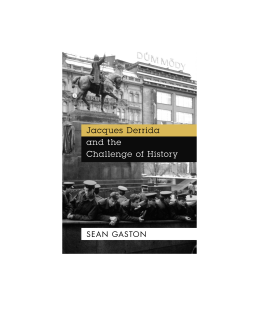
Additional Information
Book Details
Abstract
This important new book argues that Jacques Derrida’s work can be treated as the basis for a distinctive historiography. The possibility of seeing Derrida not as a philosopher of language but as a philosopher of history has become more apparent with the recent publication of Derrida’s 1964-1965 seminar Heidegger: The Question of Being and History. We now know that the problem of history was at the heart of Derrida’s writing in the mid-1960s, prior to the publication of his best-known work, Of Grammatology (1967).
Arguing that Derrida's scholarship in the 1960s and early 1970s on historicism, historicity and the problem of history can be treated as the basis for a philosophy of history, Sean Gaston focuses on Derrida's work from the mid-1970s to the mid-1990s and his relentless questioning of context, memory and narrative as the delineation of a deconstructive historiography. The book raises a challenge for historians to think about both deconstruction and historiography, arguing that contemporary philosophy can provide a basis for thinking about history in the name of a deconstructive historiography that is not incompatible with rigorous historical scholarship.
In this powerful and provocative book, Sean Gaston combs through Jacques Derrida’s works from the 1960s to the 90s with fidelity and care to argue that Derrida’s oeuvre should in fact be seen as a philosophy of history that provides a deconstructive historiography. In doing so, Gaston articulates a new kind of philosophy of history that takes up the problems of context, memory, and narrative in striking and original ways.
Ethan Kleinberg, Professor of History and Letters, Wesleyan University
Sean Gaston is Research Fellow in the School of Culture and Communication at the University of Melbourne and a Visiting Scholar at Wolfson College, University of Oxford. He is Emeritus Reader in English at Brunel University London. His previous publications include Derrida and Disinterest (2005), The Impossible Mourning of Derrida (2006), Starting with Derrida (2007) and Derrida, Literature and War (2009).
Table of Contents
| Section Title | Page | Action | Price |
|---|---|---|---|
| Contents | 7 | ||
| Acknowledgments | 9 | ||
| Preface | 11 | ||
| Part One: A Philosophy of History | 29 | ||
| 1 History and Historicism | 31 | ||
| 2 History and Historicity | 65 | ||
| 3 History and Deconstruction | 105 | ||
| Part Two: A Deconstructive Historiography | 147 | ||
| 4 History, Context, and Mi-lieu | 149 | ||
| 5 A History of Contexts | 171 | ||
| 6 History, Memory, and Memoir | 201 | ||
| 7 The Problem of Historical Memory | 235 | ||
| 8 History, Event, and Narrative | 261 | ||
| 9 A Witness of a Witness | 293 | ||
| Bibliography | 317 | ||
| Index | 337 | ||
| About the Author | 349 |
